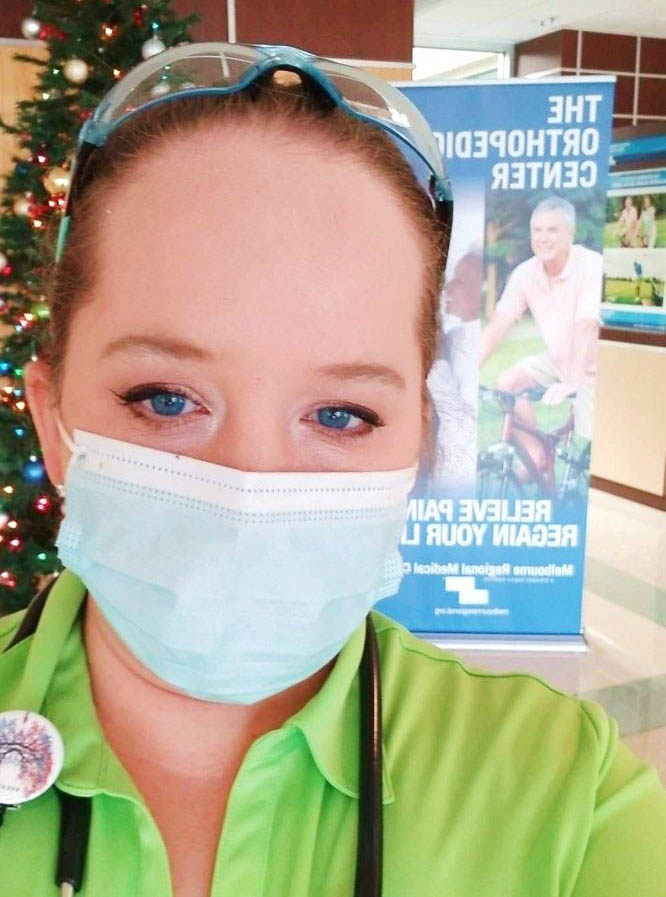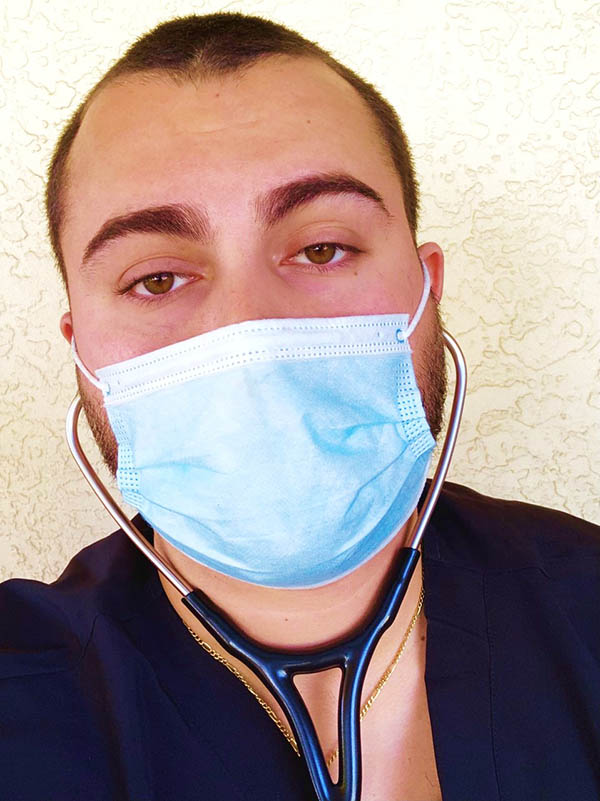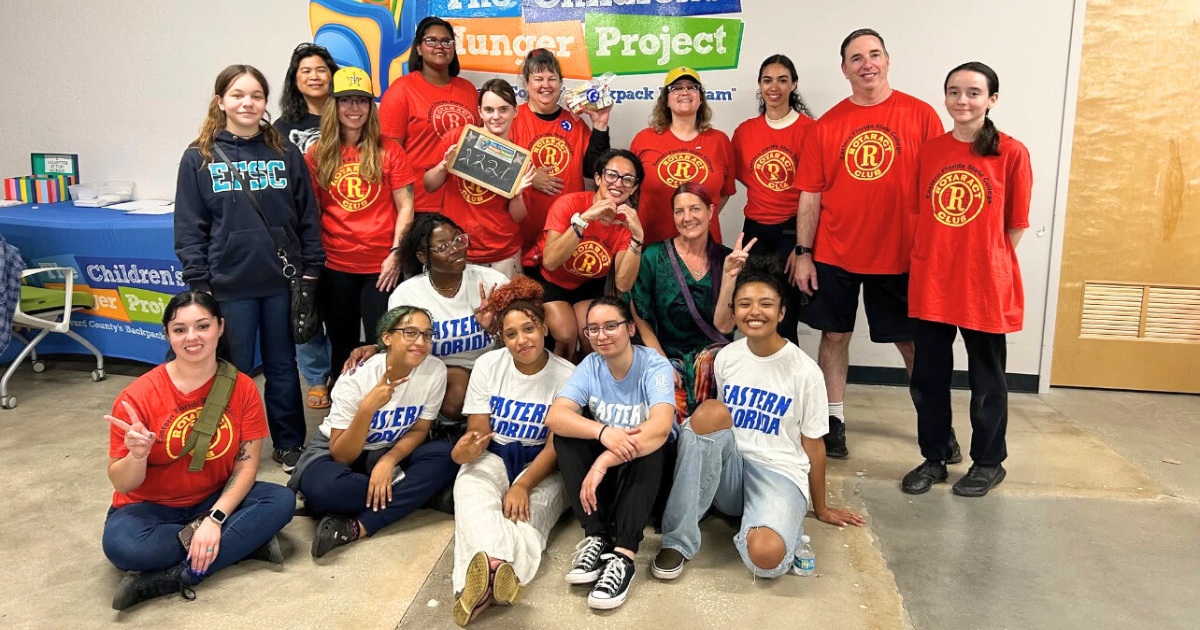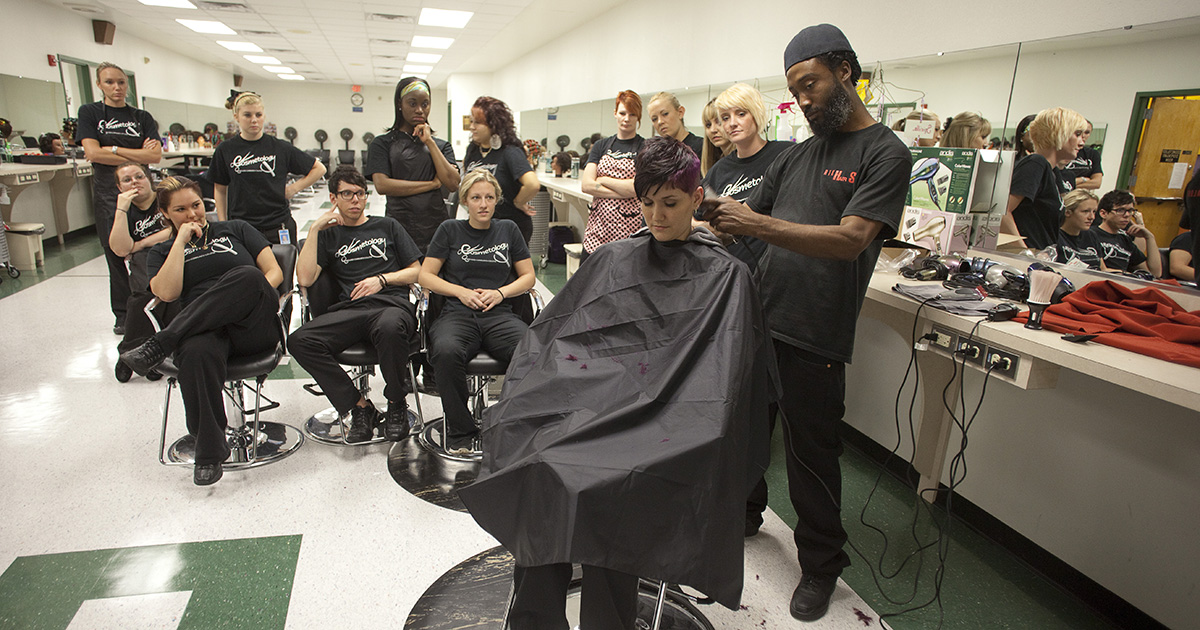Would others describe you as compassionate, persistent, and calm under pressure? Are you both a hands-on and a textbook learner? Do you dream of going to bed each night knowing that you made a difference in someone’s life? EFSC’s Respiratory Care A.S. degree could be the perfect program for a student like you!
Standing on the front lines against cardiopulmonary diseases, respiratory therapy has become critical in the battle against COVID-19 and other respiratory conditions. Sarah Pace, a recent graduate of EFSC’s Respiratory Care A.S. program, and Jason Jabbari, who is halfway through completion, recently shared their academic journeys, success stories, and advice for future students who decide to pursue this rewarding health care career.
What Made You Realize This Was the Right Degree Program for You?
Jason: After I graduated from UCF last year with a Health Science degree, I started thinking about how to use it. Respiratory therapy is becoming well-known due to COVID. What sets the respiratory therapy program apart is you get more direct interactions with patients. You usually only see that with nursing, medical doctors, and physical therapists.
Sarah: Through some medical events with my family, I saw the critical role respiratory therapists played and started researching it. I found out we had a program right here at EFSC! I got to see the field first-hand by shadowing the program director. It’s a lot of community care, a lot of patient care, and a lot of critical thinking. That really drew me in and made me realize: “This is what I want to do with my life.”
What is the Balance Between Hands-On Learning and Textbook Learning in this Program?
Jason: You need to have the textbook learning to understand what you’re physically doing. It’s very intricate how the different body systems interact, but respiratory therapy is also a very hands-on field. There are many aspects, like intubation, for example. Unfortunately, we see a lot of this with critically ill COVID patients. There’s also breathing treatments and assisting the doctors and nurses.
Sarah: When you first start, there’s a very nice 50/50 blend of laboratory work and textbook learning. You don’t have a divide between what you’re learning from a book and what you’re doing in a lab. Everything interweaves together. By the time we start clinicals, we have a strong foundation that allows us enter specialty areas such as ICU and feel comfortable being in those environments.
What Would You Say Is the Most Rewarding Element of Your Program and of This Career?
Jason: As a Respiratory Care student, you learn a lot very quickly. It was difficult with COVID, but we’ve been able to complete everything that’s been put in front of us. If you’re willing to learn, it’s a great program.
Sarah: I get to meet some awesome therapists, and this program has set me up for success. I have a job waiting for me. I don’t think there’s anything more rewarding than having one of the best-recognized employers in this field say, “We want you as one of our therapists!”
Getting to build relationships with patients is also rewarding. You work with them daily during your practicums. It’s awesome when you see your patients go home. Sometimes they follow up and let you know how they and their families are doing. You get to go to bed at night knowing you changed somebody’s world for the better.
What Is One Thing You Wish You’d Known Before Entering This Program?
Jason: There’s a lot of information to learn in respiratory therapy. It’s going to take time to process. You can’t cram before a test. You must put in the effort to really learn it, not just memorize it for the exam.
Sarah: I had to alter how I learned. I was very rigid going in, but rigidity doesn’t work with this program. You must be open to different styles of learning.
What Are 3 Things a Student Needs To Develop To Be Successful in the Respiratory Therapy Field?

Jason: Have solid interpersonal skills. When you’re dealing with patients, you must be able to deal with all different kinds of people with different backgrounds and different personalities who aren’t necessarily happy. They are in the hospital. Usually, respiratory therapists deal with critical patients. Know how to adapt to different situations as they arise.
Time management is a very big thing, whether that’s in the classroom or in the working world. When you get a list of patients, you must make sure that you’re seeing all these patients within the proper time frame. Allocate the proper amount of time for studying in the classroom, too.
It’s also helpful to at least be familiar with how a hospital works and how health care systems run. If you’ve never been to a hospital, never been around sick people before, it’s difficult to just jump in and be comfortable with it. I previously worked at Cape Canaveral Hospital delivering food trays. It was minimum wage work, but in many ways, I feel that it prepared me for this program better than my four-year bachelor’s degree from UCF. There’s an added component when you’re dealing directly with patients that is not there when all you’ve ever seen before is what’s in the classroom.
Sarah: Time management is a huge one. I personally have operated out of a planner and calendar on my phone. Have something that works for you. It’s vital.
Have a strong sense of perseverance. There will be times when it’s tough and you’ll want to throw in the towel, but keep your nose in your books and push through, because the rewards at the end are great.
Be humble. Always be willing to ask for help. There’s no shame in asking for help. Don’t be so prideful that you don’t ask questions.
What Experiences Helped Prepare You for This Program? How Would You Advise students Who Have No Experience Coming Into This Field?

Jason Jabbari.
Jason: Working as a food tray deliverer at Cape Canaveral Hospital, interacting everyday with the doctors, nurses, and technicians, made the biggest impact on my program preparation. This, coupled with my four-year health science degree, certainly helped with learning respiratory therapy concepts.
If you have no health care or medical experience, volunteer at your local hospital or clinic, even if it’s not pertaining to respiratory therapy.
Just interacting with the personnel there, seeing how things are run and how health care operates in this country, will prepare you greatly.
Sarah: I already had experience working as a veterinary technician, so I had a strong medical background. However, I also shadowed our respiratory therapy program director for several weeks.
I would encourage any new student thinking about respiratory therapy to shadow a respiratory therapist, so you have an idea of what you’re getting into.
How Has EFSC’s Respiratory Therapy Program Prepared You To Enter the Field?
Jason: I’m at my midpoint and have one year left. Job opportunity-wise, the prospects are incredible. For example: Travel contracts where you can make up to 10 grand a week. There is work out there, especially due to COVID. You’re going to find work, and you’re going find rather high-paying work.
Sarah: Even before graduation, I had a job waiting for me. I have had multiple job offers and daily emails from travel agencies wanting to hire me. There are multiple places offering sign-on bonuses for respiratory therapists. There’s not only work but financial incentive out there as well.
Health First, which is one of the largest health care systems in Brevard, reached out to our program wanting to know who would be interested in hiring on with them. Recently, we had a meeting with all the managers of Orlando Health for a hiring event. Travel agencies are constantly either emailing or texting us. As soon as you’re established with your education and training, you can go straight into the field. There’s no gap.
Do You Have Any Closing Thoughts About the Program or Your Experience?
Jason: The work that you will be doing is important work. You’ll never go home and think, “Oh, that was a waste of a day!” You’re contributing to the care of a patient. Don’t be afraid to apply for this program, but ensure that you have a solid background in health care or the medical field. Don’t come in thinking that you’re going to learn the fundamentals just by being in class. Be willing to work, willing to learn.
In this program, everybody is going to help you, and everybody is friendly. Whether you learn from your peers or from the teachers, it’s a group effort.
Sarah: If you’re thinking about respiratory therapy, do you research, and then put your heart and soul into it. In the end, you’re not only are you going to grow as a person, but you can also go to bed at night knowing that you’ve changed somebody’s world.
Our program has a good core set of teachers, and we all help each other out. You don’t get that kind of camaraderie in a general education classroom. In respiratory therapy, we work as a team to achieve an ultimate outcome, and we know we are there for each other. We’re all excited. We even walk the stage together at graduation. It’s an awesome feeling.
Wondering If a Career in Respiratory Care Is Right for You?
Begin by visiting the Respiratory Care A.S. degree program page to learn more about its student selection criteria and application process. Then, be sure to speak with a Career Center Coordinator to determine whether this is the right career path for you, discover similar careers, and take the next step in your professional development. We look forward to working with you!




